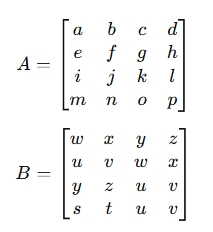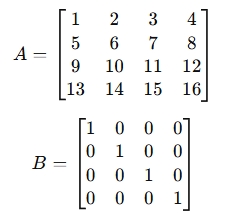4x4 4th-order matrix multiplication calculator
|
| |||||||||||||||||
|
| |||||||||||||||||
| Results: | |||||||||||||||||
| A x B = |
| ||||||||||||||||
What is a 4×4 Fourth-Order Matrix Multiplication Calculator?
A 4×4 Fourth-Order Matrix Multiplication Calculator is a tool that computes the product of two 4×4 matrices. Matrix multiplication is an essential operation in linear algebra used for various purposes in fields such as physics, engineering, computer science, and machine learning.
Given two 4×4 matrices:

The product matrix C=A×B is calculated by taking the dot product of rows of A with columns of B. The element Cij is computed as:

This operation is performed for all elements of the resulting matrix C.
Why Use a 4×4 Matrix Multiplication Calculator?
- Efficiency – Manual matrix multiplication for large matrices is time-consuming and error-prone.
- Accurate Results – Avoids calculation mistakes in multi-dimensional matrix operations.
- Used in Many Fields:
- Physics & Engineering – For transformations, rotations, and systems of equations.
- Computer Science & Machine Learning – In neural networks, image processing, and data transformations.
- Economics & Finance – For analyzing Markov chains, risk assessments, and financial models.
- Graphics & Animation – In 3D rendering and computer graphics.
How Does It Work?
- Input two 4×4 matrices.
- Multiply the rows of matrix A by the columns of matrix B, following the formula.
- Calculate all elements of the resulting matrix using the dot product method.
- Display the resulting 4×4 matrix.
Example Calculation
Given the matrices:

The product matrix C=A×B is:

In this example, the result is the same as matrix A since multiplying by an identity matrix doesn't change the values.
When to Use It?
- In computer graphics – For performing transformations (scaling, rotation) in 3D space.
- In physics & engineering – For solving systems of equations and analyzing forces.
- In machine learning – For operations in neural networks, such as weight transformations.
- In data science & AI – For transforming data in dimensionality reduction or feature extraction.